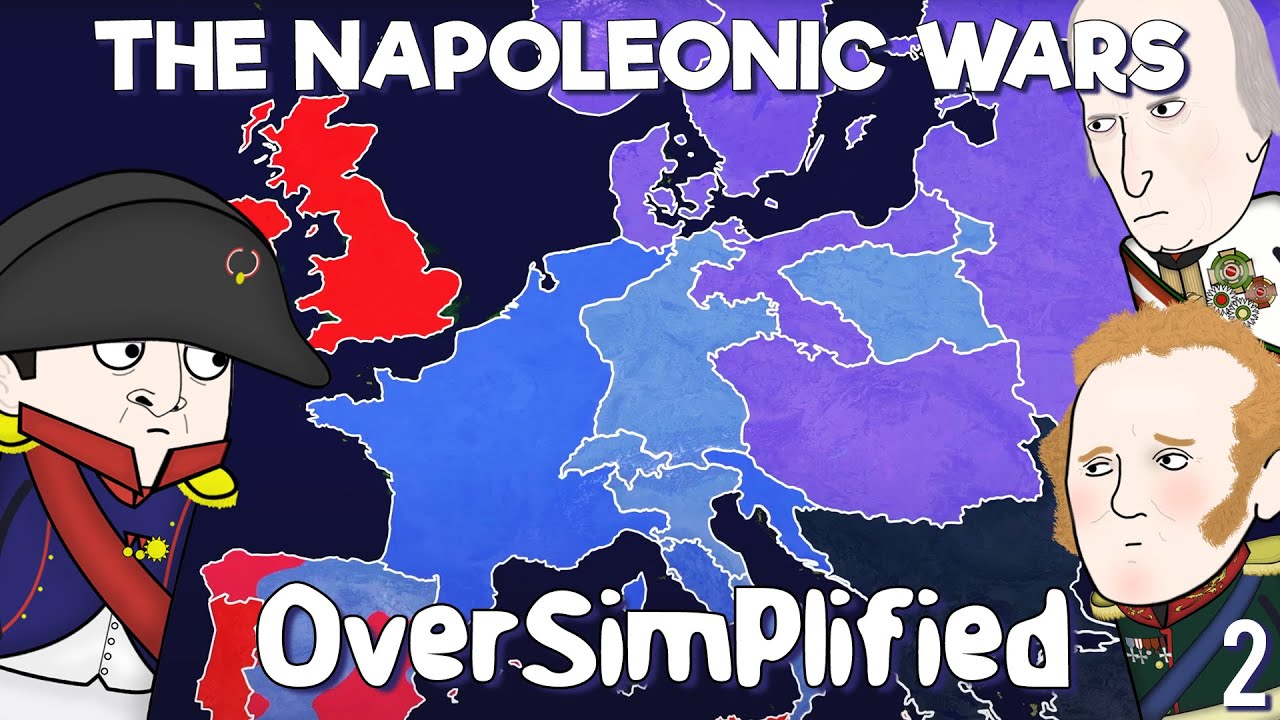ERA NAPOLEÔNICA - Resumo de História
Summary
TLDRThe video explores the rise and fall of Napoleon Bonaparte, focusing on the Napoleonic Era (1799-1815). It details Napoleon's rise to power following the French Revolution and the subsequent establishment of the Consulate and Napoleonic Empire. Key events include military victories, the creation of the Napoleonic Code, and the implementation of the Continental Blockade. However, despite initial successes, his empire crumbled after a series of defeats, culminating in the Battle of Waterloo in 1815. The Congress of Vienna followed, reshaping Europe's political landscape and isolating France, marking the end of Napoleon's reign.
Takeaways
- 😀 Napoleon Bonaparte played a pivotal role in shaping French and world history during the Napoleonic Era (1799–1815).
- 😀 The Napoleonic Era can be divided into three phases: the Consulate, the Napoleonic Empire, and the Hundred Days government.
- 😀 Napoleon rose to power in 1799 after staging the Coup of 18 Brumaire, which led to the establishment of the Consulate.
- 😀 The Consulate period granted Napoleon the title of First Consul, concentrating power in his hands, with the potential for dictatorship.
- 😀 In 1804, Napoleon declared himself Emperor of the French, marking the beginning of the Napoleonic Empire and introducing the Napoleonic Code.
- 😀 Napoleon's military successes included defeating the Second Coalition, the Austrian army at the Battle of Marengo, and the creation of the Confederation of the Rhine.
- 😀 The Continental Blockade of 1806, designed to weaken Britain, led to strained relationships with other European countries dependent on British trade.
- 😀 The invasion of Portugal in 1807, prompted by its defiance of the Continental Blockade, led to the Portuguese royal family fleeing to Brazil.
- 😀 Napoleon's invasion of Russia in 1812 resulted in disastrous losses for the French army, contributing to his eventual downfall.
- 😀 After his defeat in 1814 and exile to Elba, Napoleon returned to power in 1815 for the Hundred Days but was ultimately defeated at the Battle of Waterloo.
- 😀 Napoleon's exile to Saint Helena following his defeat at Waterloo marked the end of the Napoleonic Era, while the Congress of Vienna reshaped Europe to maintain peace.
Q & A
What was the Napoleonic Era and when did it take place?
-The Napoleonic Era was a period in European history from 1799 to 1815, during which Napoleon Bonaparte ruled France. It is divided into three phases: the Consulate, the Napoleonic Empire, and the Hundred Days Government.
What event marked Napoleon's rise to power?
-Napoleon rose to power following the French Revolution, which created political instability. In 1799, he executed the Coup of 18 Brumaire, overthrowing the existing government and establishing the Consulate regime, with himself as First Consul.
What were the three main phases of the Napoleonic Era?
-The Napoleonic Era was divided into three phases: the Consulate (1799-1804), the Napoleonic Empire (1804-1814), and the Hundred Days Government (1815).
What significant reforms did Napoleon implement during his rule?
-Napoleon introduced several key reforms, including the Napoleonic Code, which institutionalized the ideals of the French Revolution, and the separation of church and state. He also centralized government and administration.
How did Napoleon consolidate his power after becoming First Consul?
-Napoleon consolidated power by creating a new constitution, which granted him dictatorial powers and established him as First Consul for a period of 10 years. This allowed him to stabilize France and strengthen his control.
How did Napoleon deal with France's enemies during his reign?
-Napoleon led numerous military campaigns, defeating coalitions of European nations. Key victories included the Battle of Marengo (1800) and the creation of the Confederation of the Rhine in 1806. However, his efforts to weaken Britain through the Continental Blockade had mixed results.
What was the Continental Blockade and how did it affect Europe?
-The Continental Blockade was a trade embargo imposed by Napoleon in 1806 to isolate Britain economically by prohibiting European nations from trading with the British. While it hurt Britain's economy, it also negatively affected the countries in Europe that depended on British goods, leading to discontent and eventual resistance.
What led to Napoleon's downfall?
-Napoleon's downfall was largely due to his failed invasion of Russia in 1812, followed by a series of defeats in 1813. The combined forces of Prussia, Austria, and Britain defeated him in the Battle of Leipzig, leading to his exile to Elba.
What happened during Napoleon's Hundred Days?
-During the Hundred Days, Napoleon escaped from his exile on Elba, returned to France, and reclaimed power. His reign lasted for a brief period until he was defeated at the Battle of Waterloo in 1815, marking the end of the Napoleonic Era.
What were the consequences of Napoleon's final defeat?
-Following Napoleon's defeat at Waterloo, he was exiled to the island of Saint Helena, where he died in 1821. The Congress of Vienna, held in 1815, reorganized Europe, established a balance of power, and aimed to prevent future conflicts by isolating France.
Outlines

Dieser Bereich ist nur für Premium-Benutzer verfügbar. Bitte führen Sie ein Upgrade durch, um auf diesen Abschnitt zuzugreifen.
Upgrade durchführenMindmap

Dieser Bereich ist nur für Premium-Benutzer verfügbar. Bitte führen Sie ein Upgrade durch, um auf diesen Abschnitt zuzugreifen.
Upgrade durchführenKeywords

Dieser Bereich ist nur für Premium-Benutzer verfügbar. Bitte führen Sie ein Upgrade durch, um auf diesen Abschnitt zuzugreifen.
Upgrade durchführenHighlights

Dieser Bereich ist nur für Premium-Benutzer verfügbar. Bitte führen Sie ein Upgrade durch, um auf diesen Abschnitt zuzugreifen.
Upgrade durchführenTranscripts

Dieser Bereich ist nur für Premium-Benutzer verfügbar. Bitte führen Sie ein Upgrade durch, um auf diesen Abschnitt zuzugreifen.
Upgrade durchführenWeitere ähnliche Videos ansehen

ERA NAPOLEÔNICA | QUER QUE DESENHE | DESCOMPLICA

NAPOLEON BONAPARTE - PAHLAWAN REVOLUSI PRANCIS

REVOLUSI PERANCIS - Runtuhnya Monarki Absolut Perancis [Materi Sejarah Kelas XI Peminatan SMA/MA]

The Napoleonic Wars - OverSimplified (Part 2)

Napoleonic Wars in 8 Minutes - Manny Man Does History

Napoleon Bonaparte I Der Aufstieg I musstewissen Geschichte
5.0 / 5 (0 votes)
